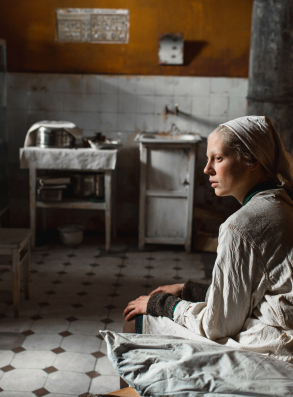
- Golden Globe Awards
Beanpole (Russia)
Born in Nalchik, Russia, director Kantemir Balagov graduated from Kabardino-Balkarian University. Several of his short student films were shown at the Locarno Film Festival. Balagov studied under Russian director Alexander Sokurov for three years and made his debut feature with Closeness. His unique style of directing, writing, and keen photographic eye set him on a path to become a very important filmmaker. Beanpole, submitted for Golden Globe consideration this year, is the story of a young woman experiencing PTSD who joins forces with a female veteran in war-ravaged Leningrad, following the end of WW2. The film previously won the Best Director prize in the Un Certain Regard section in Cannes.We have seen many examinations of the after-effects of World War II. What is the world view that we haven’t seen from the Russian perspective? For me, my most important goal was to tell a story about a female fate in the post-war world, because in the contemporary Russian film this theme has never been examined in a significant way. And (I chose) Leningrad (…) because I needed a city which survived hardships during the war, and which will resonate with the fates of my characters.Were these instances that you researched and specific stories you were aware of?My most important research came from Svetlana Alexievich’s book, “The Unwomanly Face of War.” It’s a non-fiction book that consists of small female stories about the war. Nobel Prize winning book. And later on, when we were working with Aleksandr Terekhov my co-screenwriter, he studied diaries, books about the siege of Leningrad, and he worked in the archives as well. Some of the details for my characters came out of the archives that we researched.Talk about the choice of using long scenes with no dialogue as you do in the opening shots.It’s really important for me to immerse the audience in Iya’s mental state, when she just freezes. This is like a defense mechanism that allows you to leave the world, the real world and immerses yourself into your internal world. And you realize that obviously when she freezes that this plays a very important dramatic role in the story. So it was important for me that the first time we see her freeze would be very dramatic and we would remember it for the rest of the film. The young child is phenomenal. He looked like somebody from the war…The hardest thing was casting the boy because most of the kids these days, they are good looking and healthy and it’s a product of the contemporary world, because people care about each other. But we were really lucky with this kid. Can you talk about the balance between the lightness and darkness of storytelling? Why do you think you identify so strongly with this woman’s point of view?When I was studying under Alexander Sokurov, he used to say to us that when you work on your heroes and on your stories, a director has to be gender-neutral. He doesn’t have to be male or female. And I was very moved by this advice and I really believe in this, that in cinema, it doesn’t have to be a gender, it has to be neutral. But also, it’s important that most of my life I lived with my mother and it’s formed me in many ways.Which authors influenced you when you studied literature? And, can you talk about the look of the film?When it comes to authors, I like classics mostly. But if you want to know my favorite, it’s Andrei Platonov and Fyodor Dostoevsky. I know it sounds banal, but it is what it is. When it comes to the color palette, in Closeness my inspiration came from photo-documentary and in Beanpole we decided to do it the other way and my inspiration was Art. Mostly inspired by the old Dutch masters, there’s a special color drama in the film, every color is specific, every character has a specific color and every situation has a specific color.

